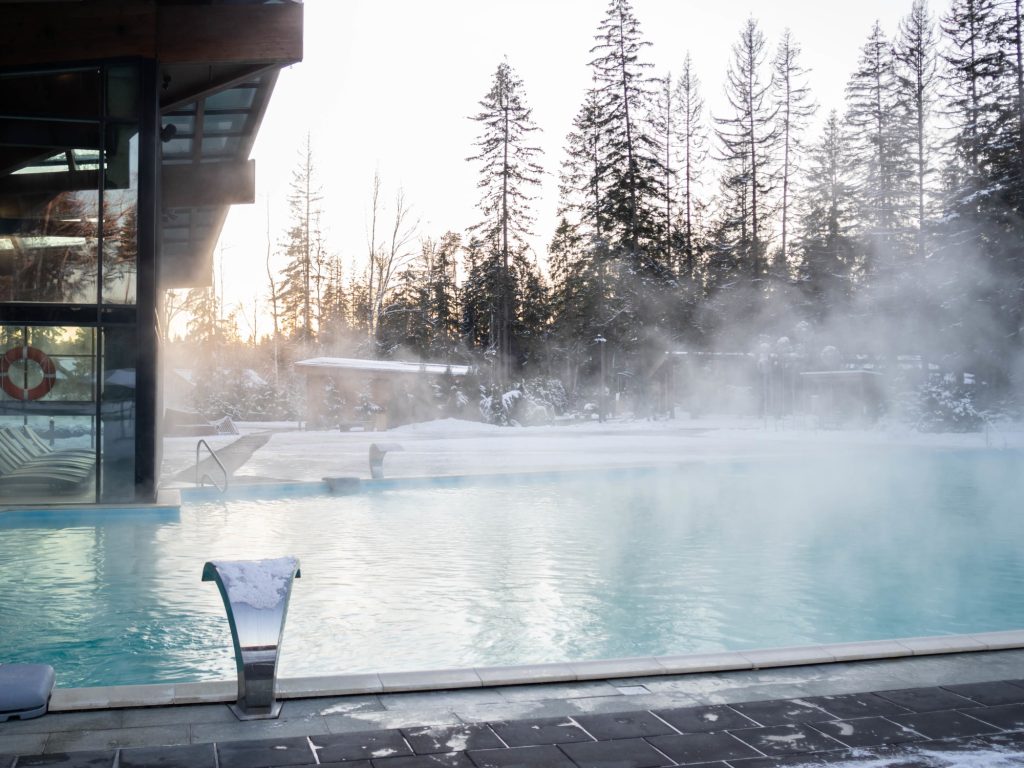In our article, we will provide you with a step-by-step guide on choosing a pool heater that works for your needs (read our review of the best pool heaters here), pros/cons of each type and typical mistakes as well as FAQs to make sure that you can pick the right model for your requirements and that your expectations from it will match the reality.
“I purchased a pool heater to stretch our swimming season for another 3 to 4 months. Although it works, it takes a lot of time and I can barely heat the water to 80°F within 2 days. I’m not happy…”— says the owner of a pool heater from the USA.
People often may feel like their pool heater didn’t fulfill their expectations, in most of the cases the reason is in the choice of the heater. The author of the comment probably has chosen the wrong size or wrong type of heater.
Why did pool heaters become so popular?

Source: Instagram
In recent years, pool heaters became extremely popular due to several reasons.
The first benefit of using a pool heater is an extended swimming season. Thanks to a pool heater, you can prolong the season by 3-5 months or even swim in the pool year-round (it will depend on the climate type in your area).
Secondly, the constantly heated water will prevent the pool from damage in winter. Some water may remain in the plumbing system of your pool even after draining it. Once this water freezes, it can damage the pipes and cause them to burst. Besides, due to fluctuating temperatures, the tiling of your pool may buckle. The constant flow of a warm temperature will prevent the pool from such damage.
Thirdly, swimming in the water with a constant and comfortable temperature will benefit your health. Regular swimming sessions will improve blood circulation and relax your muscles. If you have respiratory problems, regular swimming procedures will help. Besides, the warm water in your pool will help to release stress, after a long and tiring day.
Choosing the right pool heater step-by-step:
Before jumping into the types of heaters, we will provide you with a step-by-step guide which will help you to understand the type of heater that you will need. The guide includes the following steps:
- Type of pool: above ground and inground;
- Your swimming pool size;
- Your budget;
- How quickly you want to heat your pool;
- Type of climate;
- Law regulations in your area;
In our recent research, we have distinguished 3 of the best pool heaters:
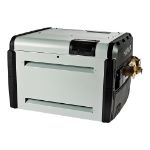 | 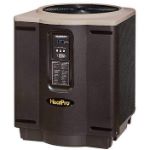 | 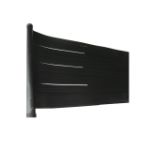 |
Price range: $$ • Heater type: Natural gas; • Pool type: inground/above ground; • BTU Rating: 150,000 - 400,000; • Efficiency: 83% (great); • Warranty: 1 year; | Price range: $$$ • Heater type: Heat pump; • Pool type: above ground; • BTU Rating: 90,000; 140,000; • COP: 5.7 (great); • Warranty: 1 year; | Price range: $ • Heater type: Solar; • Pool type: inground; • Size: 4 ft. x 20 ft.; • Panel area: 80 square feet; • Warranty: 5 years; |
1. Type of pool: above ground and inground
The main difference between an above ground and an inground pool is that an above ground pool loses more heat than an inground pool. The sides of an above-ground pool are not isolated (as in inground pools) so heat escapes from the top and through the sides.
What does it mean for a heater? The above ground pools require a more powerful heater to increase the water temperature. The manufacturers usually indicate what type of pool their heater will be suitable for. Some heaters are good for both types. For example, gas heaters like the Hayward H-Series Natural gas and Hayward H-Series Propane, heat pump Hayward HP50HA, electric heater Hayward CSPAXI.
2. Your swimming pool size
You should know the pool area to help you pick the right size of the heater which will be powerful enough to heat your pool. Knowing the pool area is necessary to calculate the size of the heater.
3. Your budget
Before making a decision, you should consider both the initial costs and operating costs.
The cheapest types of heaters are electric ones and their price starts at $500 (jump to the section with electric heaters) and gas-operated — from $1,000 (jump to the section with gas heaters). The most expensive can be solar heaters — around $3,000 (jump to the section with solar heaters) since you will need to buy several panels to heat the pool efficiently and you will spend some money on the installation (solar panels are often installed on the roof).
However, operating costs will differ. In this case, the most expensive will be an electric heater (around $6 per hour) and gas heater (around $7 per hour); solar heaters will not cost a dollar for operating (utilize the sunlight).
The “golden mean” among the heater types is a heat pump. Its initial cost starts from $2,000 and operating costs are very low, an hour of its running costs 80 cents on average.
4. How quickly you want to heat your pool
The speed of heating the water depends on the heater type and environment conditions (air temperature, amount of sunlight).
If the main feature you are looking for in the pool heater is the quick heating of the water, a gas heater will be perfect for you. On average, it will increase the water temperature by 3-4ºF per hour which is 2 times faster than any heat pump (1-2ºF per hour).
Solar heaters are the slowest among the heaters and raise the water temperature by 7-10°F per day.
5. Type of climate
The outside air temperature and amount of sunlight will affect your pool heater performance. For example, heat pumps and solar heaters are highly dependent on stable weather conditions unlike gas and electric heaters.
The heat pumps need constantly high air temperature (over 50°F) and solar heaters require a lot of sunlight. So, if you live in a cold area (temperature drops below 50°F), you should pay attention to gas heaters.
6. Law regulations in your area
The law restrictions refer to the number of emissions produced by gas heaters. In California and Texas, in 1998, a law was set up to limit NOx emissions. NOx is produced when nitrogen and oxygen gases are mixed during combustion. It is the same gas that vehicles produce.
If you would like to buy a gas heater and you live in these states, you should consider the amount of NOx emissions produced. For example, the Hayward H-Series Natural gas and the Hayward H-Series Propaneheaters produce fewer NOx emissions, are less harmful to the environment, and don’t break any laws.
Types of pool heaters
There are 4 types of pool heaters — gas heaters, heat pumps, electric heaters, and solar heaters. In the sections below, we will consider these 4 types, how they work, and their pros and cons.
In our recent research, we have picked the best pool heaters on the market, distinguished their strengths and weaknesses to ensure that you can find the perfect pool heater for your requirements.
1. Natural & Propane gas heaters
How they work
Gas heaters can operate on natural gas or propane fuels. The way gas heaters work is pretty simple — as the pumped water from the pool passes through a filter, it arrives at the heater. In the combustion chamber, the heater burns gas generating heat. Then this heat transfers to the water and the heated water is returned to the pool.
Pros and cons
Gas heaters used to be the most popular type but in recent years their popularity on the market slightly dropped. Why did this happen? Let’s consider all the pros and cons of this type of heater.
Pros:
Heats water in any weather condition. Unlike heat pumps or solar heaters, a gas heater is not dependent on the weather. It will heat the water in any season. In this way, the gas heater can maximally prolong your swimming season.
Heats water extremely quickly. Gas heaters are the quickest to heat the water. It will raise the water temperature 2 times faster than any heat pump. A gas heater increases the water temperature by 3-4ºF per hour which is impressive.
Low initial costs. The gas heater is the cheapest to buy and install among other heaters. Its cost starts at $1,000 which is low if compared to heat pumps (starts from $2,000) and solar heaters (which can cost $3,000 with installation).
Cons:
Not eco-friendly. The gas heater is the least eco-friendly among other types of heaters. It uses gas to heat the water and produces emissions. To reduce emissions, it is better to install a gas heater which produces low emissions.
High operating costs. Gas heaters along with electric heaters are the most expensive to operate. You will pay 7 times more running costs than with a heat pump. Once you use propane as a source of energy to heat the water, you will pay 1.5 times more for running than with natural gas.
If you have decided that the gas heater is perfect for you, we have 2 best options for you — a heater that runs on natural gas and propane. You can read a detailed review of these heaters here.
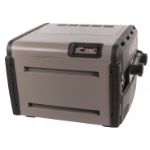 | 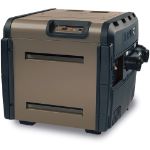 |
Price range: $$ • Heater type: Natural gas; • Pool type: inground/above ground; • BTU Rating: 150,000 - 400,000; • Efficiency: 83% (great); • Warranty: 1 year; | Price range: $ • Heater type: Propane; • Pool type: inground/above ground; • BTU Rating: 150,000 - 400,000; • Efficiency: 83% (great); • Warranty: 1 year; |
2. Pool heat pumps
How they work
At first, the principle of work is the same as with gas heaters — the water pumped from the pool runs through the filter. The main difference in the operation of the heat pump and the gas heater is that the pump takes heat from the surrounding while the gas heater produces heat by burning natural gas or propane (depends on the type of heater). For this reason, heat pumps are much more efficient than any gas heater.
The heat pump has a fan that draws in the outside air, then liquid refrigerant absorbs heat from this air and creates gas. The compressor makes this gas hot. Then the compressor transfers the heat from the hot gas into the cold pool water and finally the heated water returns in the pool.
Pros and cons
A heat pump is an innovative type of heater that is becoming popular by the day. While it has many advantages, it also has some disadvantages which make it ineffective in certain weather conditions.
Pros:
Maintains temperature. According to our research, the heat pumps are the leaders in maintaining a constant temperature. They need to run several hours per day to keep the pool water at a comfortable temperature. Such a method of maintaining constantly perfect temperature will not affect your bills as dramatically as gas heaters would. If you want to save the maximum amount of heat in your pool, we recommend using a pool cover when you don’t swim. However, when buying a pool cover, pay attention to what type of pool it is made for — inground or above ground.
Low operating costs. Heat pumps are 7 times cheaper to run than any gas heater. You will spend just 80 cents per hour on operating costs. This is because of the way they operate. Heat pumps need a small amount of electricity to start absorbing the heat from the outside environment. They just transfer the heat from one place to another while gas heaters produce it by burning gas.
More eco-friendly. Since heat pumps don’t produce heat but transfer it from one place to another using a small amount of electricity to operate, it makes them much more eco-friendly than any gas heater which burns gas and produces emissions.
Includes cooling mode. Most of the heat pumps have this option. It can be helpful if you live in an area with a very hot climate.
Cons:
Not efficient if the temperature drops below 50°F. The heat pump needs a constantly high air temperature to heat water efficiently. It is highly dependent on weather conditions, unlike gas heaters which will work in any environment.
Heats water slower than gas and electric heaters. Compared to electric and gas heaters, the heat pump is slower to raise the water temperature. It will increase the temperature by 1-2ºF per hour, which is 2 times slower than gas and electric heaters.
If you live in an area with constantly high air temperature and you want to pay less operating costs than with a gas heater, we recommend you consider the following heat pumps. To read more about them, their pros and cons, follow the link here.
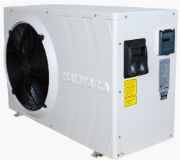 |  |
Price range: $$$ • Heater type: Heat pump; • Pool type: in ground/above ground; • BTU Rating: 45,000; • COP: 5.4 (good); • Warranty: 2 years; | Price range: $$$ • Heater type: Heat pump; • Pool type: above ground; • BTU Rating: 90,000; 140,000; • COP: 5.7 (great); • Warranty: 1 year; |
3. Electric heaters
How they work
In an electric heater, there is a heating element that runs throughout most of the unit; it is responsible for heating the pool. Once the electric current applies to this element, the element starts generating heat. When water flows over the heating element, the heat is dispersed and warms the water. Then the heated water flows into the pool.
Pros and cons
Electric heaters have a feature that distinguishes them among others — they are good for small pools (less than 5,000 gallons) or hot tubs only, let’s consider their pros and cons in detail.
Pros:
Heats water quickly. Along with gas heaters, electric heaters are the leaders in quick water heating. They raise the water temperature 2 times faster than any heat pump and can increase it by 3-4ºF per hour.
Works in any environment. Unlike heat pumps and solar heaters, electric heaters don’t need any special environment, they will perform in any weather condition.
Easy-to-install. Electric heaters are the easiest to install among other heater types. They can be easily installed without professional help.
Low initial cost. Electric heaters are the cheapest to buy. Their price starts at $500. They are 3 times cheaper than any heat pump.
Cons:
High operating costs. Although the price of the unit is the lowest, this heater will incur some costs for operating. Running costs of electric heaters are approximately the same as gas heaters — on average $6 per hour. This is 6 times higher than the operating costs of heat pumps.
Suitable for small pools or hot tubs only. As our research has shown, high-quality electric heaters are appropriate for small pools (less than 5,000 gallons) or hot tubs only.
Once you have decided that the electric heater will perfectly suit your needs, we recommend the Hayward CSPAXI. You can find a detailed review of this electric heater here.
Hayward CSPAXI
Price range: $$
• Heater type: Electric;
• Pool type: above ground/inground;
• BTU/hr: 17,000; 37,500;
• Warranty: 1 year;
(Read details)
4. Solar pool heaters
How they work
The solar heater’s principle of operation is simple. You install the solar collector which absorbs solar heat energy. When the pool water is pumped, it runs through the filter, and then the water passes through the solar collector. When the water circulates through the collector, it heats up and then returns to the pool.
During the peak months in hot areas, you can use a solar heater to cool the pool by circulating the water during the night.
Pros and cons
Solar heaters are becoming more and more popular, they are the most eco-friendly way to heat the water; moreover, they have other benefits than just eco-friendliness. Let’s consider all the pros and cons of solar heaters.
Pros:
No operating costs. That’s the only type of heater which doesn’t take a cent for operation, you just need to invest in the unit and its installation.
Silent operation. Solar heaters are the most silent type. While owners of gas heaters and heat pumps complain about some noise, with a solar heater, you will not hear a single sound.
Eco-friendly. Solar heaters are very eco-friendly. They don’t need the same energy to operate as gas, electric heaters, and heat pumps do. They utilize sunlight.
Long warranty period. The warranty period of solar heaters begins at 5 years and can reach up to 10 years, while the warranty for gas heaters and heat pumps is 1-2 years.
Can cool the water. You will probably need this function during the peak months. You just need to circulate the water through the collector during the night.
Cons:
Work only in areas exposed to sunlight. Solar heaters need a good amount of sunlight to operate. They (same as heat pumps) are highly dependent on weather conditions and won’t perform efficiently in any environment as gas and electric heaters do.
High initial cost. The cost of the unit and its installation is the highest among other types of heaters and can cost $3,000. However, with a solar heater, you will not pay monthly costs as with other heaters.
Difficult to install. Solar panels are often installed on the roof (to achieve maximum efficiency), so you will need professionals to install them safely and correctly.
If you feel that a solar heater is better for you, we recommend the following heaters. You can find here our detailed review and the list of pros/cons of each heater.
SmartPool S601P
Price range: $
• Heater type: Solar;
• Pool type: inground;
• Size: 4 ft. x 20 ft.;
• Panel area: 80 square feet;
• Warranty: 5 years;
(Read details)
Fafco Solar Bear
Price range: $
• Heater type: Solar;
• Pool type: above ground;
• Size: 4 ft. x 20 ft.;
• Panel area: 80 square feet;
• Warranty: 10 years;
(Read details)
Electric heat pump and electric heater: what’s the difference?
At first sight, it can be confusing, what is the difference between heat pumps and electric heaters, since they both need electricity to operate?
The fundamental difference is in the principle of operation. The heat pump transfers the heat from the surrounding using electric current while the electric heater produces heat (like gas heaters do). What does this mean? That means that heat pumps are more efficient and will not cost a lot for operation, they are 6 times cheaper to run than electric heaters. But heat pumps need a constantly high air temperature to operate (over 50°F) and will heat the water 2 times slower than electric heaters.
Calculate the heater size
The time and efficiency of heating your pool depend on the proper size of the heater. Before calculating the size, you need to consider factors such as:
- the pool area;
- the difference between pool and average air temperatures;
- climate features (wind exposure, humidity levels, night temperature);
They are crucial for calculating a proper heater size. The higher these indicators — the larger the size of the heater you will need.
Gas & Heat pump & Electric
Gas heaters, heat pumps, and electric heaters are rated by BTU output (British thermal units). BTU is a unit of measurement of energy (such as calories). BTU/ hr is the measure of the power of your heater, by how many degrees the water temperature will raise within an hour; the higher BTU/ hr, the quicker your pool will heat.
- Define desired water temperature for your pool;
- Define the average temperature during the coldest month of using the pool;
- Define the temperature raise needed (subtract the average temperature for the coldest month from the desired pool temperature);
- Define the pool surface area (in square feet);
- Use the formula below to determine the BTU/ hr output requirement of the heater.
BTU/hour output requirement = Pool area * Temperature raise * 12
Note: the formula is based on 1º to 1-1/4ºF temperature rise per hour and a 3-1/2 mile per hour average wind at the pool surface. For a 1-1/2ºF rise, multiply the number you have got by 1.5. For a 2ºF rise, multiply the number you’ve got by 2.0.
In our article, we conducted research and ranked the 7 best pool heaters, you will find a perfect one for your requirements.
Below we categorized our chosen heaters by their type and BTU output.
Check the detailed review of our best gas heaters, electric heater, and heat pumps to make an informed decision.
Solar heater
To pick the right number of solar panels, you should follow several rules. Keep in mind that on average, one operating solar panel can increase the water temperature by up to 7-10°F per day.
The total surface of solar panels should be equal to 50%–100% of the surface area of your pool. The bigger the total surface of solar panels, the quicker the pool water will heat. If you want to use your pool year-round, it will be better to choose collectors that cover 100% of the pool surface to provide the desired temperature even on less sunny days. If you are going to use a pool 6-8 month per year, the area of the solar panels can be 60% – 70% of the pool area.
You can read our detailed review of the best solar heaters here.
Heaters for saltwater pools
Saltwater along with poorly balanced water (high or low pH, Total Alkalinity, chlorine/bromine levels) can lead to the corrosion of metal parts in the pool heater.
The manufacturers of pool heaters take it into account and use durable, corrosion-resistant materials in the construction such as stainless steel, titanium, and cupro-nickel. However, you can provide additional protection to your heater using a zinc anode.
This little device can be installed in any place in the plumbing system of your pool where it will be in contact with the water flow. The bonding grid wire is connected to it (e.g. between filter and pump). The zinc anode will corrode over time and sacrifice itself to prevent the corrosion of metal parts in your pool.
Zinc anode
for preventing corrosion in the saltwater pool
Typical mistakes
Improper heater size. The most common mistake is a too small heater — in this case, the pool water will heat slowly and take more energy increasing operating costs. To find the right heater size, use our calculator.
Heater for a different pool type. A lot of the heaters are manufactured for above or inground pools. Take this into account so that you can maximize the efficiency of your pool heater. Jump to the section with pool types to find out more.
Summary
To choose the best-suited heater which will fulfill your expectations, you should pay attention to factors that include your requirements, climate features in your area, pool type and size, and law regulations. With an understanding of these factors, you will find a perfect pool heater and will be able to enjoy your time in the pool for much longer.
FAQs
🔧 Can I install a heater for my pool?
Yes! You can install a pool heater to an existing pool, you just need additional equipment (connections, pipes).
🥇 What is the best pool heater?
Everything depends on your requirements and the climate, e.g. gas heater lead in quick heating; heat pumps are perfect to maintain set temperatures, and solar heaters are ideal for sunny regions.
💵 How much does the pool heater cost?
The price depends on the type of pool heater. The most expensive can be solar heaters ($3,000) and the cheapest is the electric heater ($500 and more). But you should also consider operating costs. Read more in our article.
🧐 Where is it best to buy a pool heater?
Among thousands of online and offline shops, we highly recommend buying on Amazon.com. You will save money and can always count on their A-to-Z guarantee which will ensure the quality of delivery of the item.
🪙 How much does it cost to run a heater?
The operating costs for a natural gas heater will be around $7 per hour, for a heat pump, 80 cents per hour, electric heater — $6 and the solar heater is cost-free. Your bill will also depend on the outside temperature and weather.
🕯 What is the cheapest way to heat a pool?
Heating your pool with a solar heater doesn’t incur operating costs. Heat pumps are cheap to operate compared to other heaters but heat pumps and solar heaters have some weather requirements to operate. Jump to the section with heat pumps and solar heaters to find out more.
🤔 Can I use a hot tub heater for my pool?
Yes, you can, however, a hot tub heater is not going to work efficiently in your pool. It will take more energy and more time to heat the pool. Also, the hot tub heater will wear out much faster due to the huge load.


